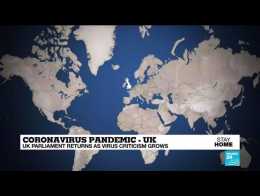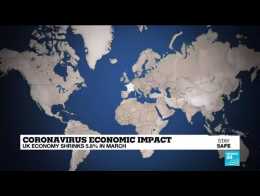May 13, 2020
James Ashfor

Jack Taylor/Getty Images
The head of Germany’s industry federation has said Brexit could be “catastrophe” if the transition period ends without a deal between the UK and EU.
Joachim Lang, managing director of Germany’s BDI, said: “If the Brexit transition phase expires without an agreement at the end of the year, it would turn an already difficult economic situation into a catastrophe.”
Negotiators from the UK and European Union have said little progress has been made on key sticking points since March and time is running out.
Talks about a long-term trade deal are ongoing, though they have been disrupted and moved online owing to the spread of coronavirus.
“Time is just too short,” one EU official told The Irish Times. “It’s very important that we make progress across all issues.”
What has the UK said?
In a speech to students and academics at ULB University in Brussels in February, David Frost, the prime minister’s chief Brexit negotiator, said the UK must be able to make its own laws.
“It is central to our vision that we must have the ability to set laws that suit us – to claim the right that every other non-EU country in the world has,” he said.
“So to think that we might accept EU supervision on so-called level playing field issues simply fails to see the point of what we are doing.”
Frost assured the EU the prospect of no deal to avoid rule-taking was not a “a simple negotiating position which might move under pressure – it is the point of the whole project”.
He also reiterated the government’s insistence that the UK will not extend the transition period beyond 2020, and will leave the EU without a deal at the end of the year if one has not been agreed, reports the BBC.
The current transition period runs until 31 December 2020, during which time the UK continues to follow EU rules.
The government responded bluntly last month to an online petition requesting a Brexit transition extension: “The transition period ends on 31 December 2020, as enshrined in UK law. The Prime Minister has made clear he has no intention of changing this. We remain fully committed to negotiations with the EU.”
The EU’s chief negotiator, Michel Barnier, said in April that progress in four areas of discussion had been “disappointing”, while the UK government released a statement saying there had been only “limited progress was made in bridging the gaps between us and the EU.”
What does the EU want?
The EU wants the UK to agree to follow its rules on fair and open competition so British companies given tariff-free access to the EU market can’t undercut their European competition.
The EU has warned that the UK won’t be allowed a “high-quality” market unless it signs up to EU social and environmental standards.
The bloc also wants the European Court of Justice to have legal powers to police any free trade agreement reached between the UK and EU.
But Frost criticised the suggestion, saying: “How would you feel if the UK demanded that, to protect ourselves, the EU dynamically harmonise with our national laws set in Westminster and the decisions of our own regulators and courts?
“The more thoughtful would say that such an approach would compromise the EU’s sovereign legal order.”
Tariffs and quotas
If a deal can’t be agreed with the EU, then the UK will default to World Trade Organization (WTO) terms from 1 January 2021.
Every WTO member has a list of tariffs and quotas that they apply to other countries.
The UK would have to apply tariffs and quotas to goods coming into the country from the EU, and the EU would apply its “third-country” tariffs and quotas to the UK.
That means the UK would be hit by big taxes when it tried to sell products to the EU market. The bloc’s average WTO tariffs are 11.1% for agricultural goods, 15.7% for animal products and 35.4% for dairy.
British car makers would be hit with a 10% tariff on exports to the bloc, which could amount to €5.7bn per year. That would increase the average price of a British car sold in the EU by €3,000.
Currently, trade between the UK and EU is tariff-free. But the Confederation of British Industry (CBI) predicts that no-deal would mean that 90% of the UK’s goods exports to the EU would be subjected to tariffs.
WTO “most favoured nation” (MFN) rules mean that the UK couldn’t lower its tariffs for any specific country or bloc, such as the EU, without agreeing a trade deal.
Without a deal, it would have to trade with every WTO member in the world on the best terms it offered any member, including the EU.
The Johnson government set out its non-preferential tariff rates and quotas on imports in the event the UK left the EU with no deal at the end of last year. The guidance was officially withdrawn when the UK agreed a transition period with the EU, but it may become relevant again if the UK fails to secure a trade deal with the bloc.
Borders
In the event of no-deal, the EU would begin imposing border checks on UK products from 1 January 2021, even if the UK hadn’t changed any of its rules and regulations.
The UK government has admitted it expects massive border queues and persistent delays for six months or longer in the UK if it leaves without securing a deal.
France has said it plans to immediately implement post-Brexit border controls at its ports in the event of no-deal. The UK government has estimated that 50% to 85% of lorry drivers would not have the necessary documentation to enter the EU via France, says The Washington Post.
HMRC has estimated that British businesses would spend £15bn extra a year on paperwork in the event of a “no deal” Brexit, reports the Financial Times.
British and EU companies would face “a significant new and ongoing administrative burden”, warns the government assessment.
Impact on economy
Pro-Brexit economists say that most trade around the world is done on WTO terms, and the UK would still have access to the EU market, says Euro News.
But many other economists and academics say that crashing out and trading on WTO terms would be damaging for the British economy, hitting the service, manufacturing and agriculture industries hard.
Brexiteers “cannot fathom the damage that relying on WTO terms to govern trade with our largest trading partner will do to the economy, even if it is obvious to the rest of the world”, says Dr Kojo Koram, lecturer in law at Birkbeck College, University of London, in The Guardian.
The UK exports nearly half (46%) of its goods to the rest of the European Union, making it by far the largest UK export market. And over half (53%) of all UK imports came from the EU in 2018.
No deal would not “be the end of the world in the sense that trade is going to stop and that everything is going to fall down”, said WTO’s director general, Roberto Azevedo. “But it’s not going to be a walk in the park either,” he added.
The UK’s economy relies heavily on its service industry, with British service providers making up 79% of the UK economy and accounting for 45% of exports. London’s position as a global financial hub would be threatened.
However, some economists believe that UK negotiators plan to use the economic damage of coronavirus to strengthen its hand, given the City of London’s status as a finance centre.
“The City of London is going to be very important as a way for governments to raise money,” Tony Travers, a professor of politics at the London School of Economics, told The New York Times.
“They may think the EU will be more concerned about upsetting things, given the scale of coronavirus, and may give them a better deal.”
–––––––––––––––––––––––––––––––
For a round-up of the most important stories from around the world - and a concise, refreshing and balanced take on the week’s news agenda - try The Week magazine. Start your trial subscription today–––––––––––––––––––––––––––––––
For a round-up of the most important stories from around the world - and a concise, refreshing and balanced take on the week’s news agenda - try The Week magazine. Start your trial subscription today–––––––––––––––––––––––––––––––
Non-EU countries
The UK crashing out of the EU with no deal at the end of 2020 isn’t just bad for UK-EU trade, it’s bad for UK trade full-stop, say some critics.
The UK could lose continuity of trade relations with many of the 72 countries that have trade deals in place with the EU, including Canada, Japan and Turkey.
While Britain is in talks to continue its participation in those agreements, so far the government has secured continuity agreements with only around a dozen countries, including Israel, South Korea and Switzerland, says the Washington Post.
The UK government has been clear that forging new trade deals with non-EU countries is one of the main benefits of Brexit.
President Donald Trump has talked up the potential for a “very big trade deal” between the US and UK, while US trade representative Robert Lighthizer said the US plans to negotiate an “ambitious” free trade agreement with the UK.
No-deal would set the UK free from rule-taking
While a no-deal Brexit would mean the UK is no longer subject to EU rules, it would not mean that every rule the UK follows is made in the UK, says Full Fact.
“We would remain members of international organisations like NATO and the WTO, and membership of these things means following collective rules or decision-making,” says the fact-checking site.
And the UK will still be subject to the European Court of Human Rights after Brexit. This court isn’t an EU body, and the UK will still remain a member after the transition period ends.
https://www.theweek.co.uk/fact-check/95547/fact-check-what-a-no-deal-brexit-really-means





